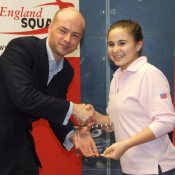By Mark Sleightholm
As hundreds of talented juniors prepare to descend on Birmingham next week for the 93rd edition of the Dunlop British Junior Open (BJO), several past champions including Ali Farag, Nour El Sherbini and Camille Serme share their memories and pass on their pearls of wisdom to today’s aspiring youngsters.
 Two-time World Champion and current World No.2 Nour El Sherbini won five titles between 2007 and 2012, and playing at the BJO year-after-year provided some unforgettable experiences. She said:
Two-time World Champion and current World No.2 Nour El Sherbini won five titles between 2007 and 2012, and playing at the BJO year-after-year provided some unforgettable experiences. She said:
“Every BJO tournament has a special memory. Winning my first ever international tournament when I was 11 is one I will never forget. I was proud to end my junior career with five BJO titles.
“It’s a huge opportunity to play this tournament, gain experience, meet new friends from different countries, and most importantly it’s just the start, not the end.”
Sherbini’s experience is echoed by that of fellow Egyptian Ali Farag who won the Under 19 title in 2011. He said:
“Every top player of every nation used to compete at the BJO, so to win you have to be the best in the world. It was by far the biggest thing you can achieve as a junior.”
“My fondest memory was definitely winning the Drysdale Cup. To reach a final for the first time, beat Amr Khalifa who’d taken away my dream in the final of the World Champs six months earlier, and in straight games is by far my biggest achievement to date.”
 The opportunity to play against the best in the world also made the British Junior Open special for Olivia Blatchford, who won the Under 15 title in 2007.
The opportunity to play against the best in the world also made the British Junior Open special for Olivia Blatchford, who won the Under 15 title in 2007.
“To know that you were playing with the best is one of the most incredible experiences there is to have as a young person. It gives you such an opportunity to grow and find yourself in a way that’s so powerful. I’d go home every year a better squash player and a wealth of experiences richer,” says Blatchford.
For two-time champion Camille Serme, playing in the British Junior Open was a real privilege.
“The BJO was our kind of world championships, everyone was playing it and it was really prestigious. It was an honour to compete at this event and even crazier to win it,” Serme recalls.
It also meant the world to two-time champion Emily Whitlock of England who said:
“I won my first title in 2011 which was insane then my second title in 2013 – it was my last ever junior match. It meant a lot to win,” recalls Whitlock.
Meanwhile, the British Junior Open offered five-time champion and current World No.1 Mohamed ElShorbagy, the opportunity to progress as a player.
“Whenever I went to these top junior events, I went to learn. The main target was never to be the best junior player in the world, it was to be the best player in the world,” says Elshorbagy
Last Words :
Camille Serme’s advice to today’s young hopefuls is to learn from the experience.
“Enjoy your squash, take as much as experience as you can get and don’t worry, you can get chopped in the first round and still win it one day,” she said.
Blatchford, meanwhile advises youngsters to stand back and take stock.
“Don’t be afraid to slow down, take a moment to remind yourself where you are, how blessed you are to be here and how capable you are to leave everything on the line,” she explains.
Finally, Farag encourages youngsters to keep going whatever happens.
“Give it your 110%, but always keep in mind that it’s not the end of the world if you don’t win it. Always remember, Amr Shabana never got past the semi-final stages of the BJO, and he’s probably the GOAT (after Jansher and Jahangir),” he said.
The 2012 and 2007 Presentations, featuring many of the world’s top players of the following decade








